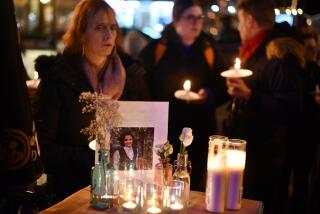10 years on, death of teen Chelsea King has created a legacy of advocacy
Chelsea King’s disappearance a decade ago gripped the region.
The 17-year-old had gone for an after-school run around Lake Hodges in northern San Diego County. There, she ran into a rapist and killer.
Within months, the college-bound runner who loved sunflowers became the namesake of legislation targeting sex predators who target children. She became the inspiration behind an annual run. She became the face of a foundation that has awarded $800,000 in college scholarships.
Subscribe to our daily news podcast
And on Tuesday, the 10th anniversary of her kidnapping, rape and murder, Chelsea’s father has announced he will launch Protect the Joy, which he said will be a national advocacy organization to address issues that affect children, including sexual assault, gun violence, opioid abuse and cyberbullying.
The launch will also mark 10 years of grieving for Chelsea’s family.
“For the longest time after Chelsea was murdered, it was really hard to accept the whole concept that we are not going to see her again,” her father, Brent King, said last week.
“Ten years feels like 100 years, but it also feels like one year.”
Clues and a fast arrest
A decade ago, Chelsea’s mother, father and little brother lived in Poway. She was a high school senior and a track runner, a bright girl who would get a stack of college acceptance letters from the 11 schools to which she’d applied.
The tragic tale actually started a year earlier, in February 2009. On a rainy morning, before 7 a.m. the day before Valentine’s Day, 14-year-old Amber Dubois vanished en route to Escondido High School. Investigators had no clues, no leads, no way to discern whether the shy blue-eyed brunette had been a victim or a runaway.
Then a year later, Feb. 25, 2010, Chelsea failed to return home from a run around Lake Hodges near Escondido.
This time, there were clues. Her car was parked at a trailhead, her cellphone and iPod were inside.
There were witnesses. A female jogger saw a man later identified as John Gardner III on the trail, smoking a cigarette, empty beer cans scattered about. He was chatty with the jogger, and warned about a nearby snake, coiled and rattling. Another witness saw Gardner walking one of the park’s many trails. A few minutes later, Chelsea jogged down the same path.
And there was physical evidence. The day after Chelsea disappeared, searchers found her shoe and underwear — and Gardner’s DNA. He was in the criminal database, for an attack on a 13-year-old girl a decade earlier. He was jailed.
Within days, Gardner’s own attorneys asked him the question that had tugged at the region since his arrest: Did he know what had happened to Amber? Yes, he told them. He agreed to lead them to her body in remote Pala, Calif. Authorities ultimately agreed to take the death penalty off the table.
Gardner pleaded guilty to raping and murdering the two girls, and trying to rape a third victim, another jogger on a Lake Hodges-area trail.
Chelsea’s Law
In criminal-justice terms, resolution in the court case came quickly. Just 78 days passed from the attack on Chelsea to her killer’s sentencing in San Diego Superior Court to two terms of life in prison without the possibility of parole, plus another 25 years to life.
Also fast-moving was work to write and pass Chelsea’s Law, legislation brought by then-Assemblyman Nathan Fletcher.
The Kings, Fletcher said last week, reached out to him on a Sunday afternoon not long after Chelsea’s death. “I will never forget going to the door and Brent answering — and I started crying,” said Fletcher, now a San Diego County supervisor.
The legislation they wanted was a tough ask. At that time, the state was in a massive budget crisis and the overcrowded prison system was under federal receivership. This bill was a proposal that sought to keep people in prison longer. Still, Fletcher agreed to lead the fight.
For the next seven months, “that’s all we did,” Fletcher said of himself and his staffers. There was a 9 p.m. staff call every night, and a white board to track their progress. There were collaborations across the aisle and red-eye flights. There were hurdles, sometimes daily amendments, a lot of politics and “a number of times we thought we would lose the bill entirely.”
But they reached agreement. Then-Gov. Arnold Schwarzenegger signed Chelsea’s Law in September 2010.
The family and the politician announced the legislation on a rainy day. “My copy of Chelsea’s Law,” Fletcher said, “still has the rain droplets on it.”
Chelsea’s Law ratcheted up punishments for those convicted of forcible sex crimes against children and calls for some sex offenders to be screened for future risk. It also has a rare provision: It allows a defendant to be sentenced to life without the possibility of parole for a crime other than murder.
In the last decade, Brent King said, California has charged 2,500 defendants using the law.
The San Diego County district attorney’s office has filed charges under Chelsea’s Law in 276 cases. Deputy Dist. Atty. Patrick Espinoza, chief of the division that prosecutes sex crimes and human trafficking, said the law is used in cases so serious that the defendant is deserving of the most serious punishment possible.
Work in Chelsea’s name
When Chelsea disappeared, hundreds turned out to search for her. And less than a month later, people turned out to finish her run at the lake. Organizers expected several dozen people. It turned out to be 3,500.
Chelsea’s family moved to a Chicago suburb in the months after her death but stayed involved in San Diego events in their daughter’s name.
“Finish Chelsea’s Run” grew into an annual event and eventually moved to Balboa Park. The last run, in March 2018, drew 8,000 people.

The family also created the Chelsea’s Law Foundation, which has over the last decade awarded $800,000 in scholarships to students in San Diego County.
In fall 2018, the King family announced the annual run would end. Instead, they shifted to Protect the Joy, an new advocacy organization designed to be a voice for all aspects of childhood safety and an advocate for legislation which achieves that goal.
The idea is to focus on protecting children from all sorts of dangers, from sexual predators to gun violence.
People can join Protect the Joy for $10 a month.
King deeply misses his daughter. “I know that there is loss,” he said last week. “I know I don’t get to physically be with her. But I am with her all the time.”
He has come to look at her as “San Diego’s daughter” for all the people, all of the then-strangers, who grieved and came together. He speaks of those who embraced his family, who worked on the legislation, who handled the annual race, who helped with the foundation in her name.
He speaks of the “life force” that radiates in her pictures and the effect she had even on strangers.
“She is a reflection of San Diego,” Brent King said. “She is sunshine in a human.”
Chelsea King and Amber Dubois both have a stretch of highway named after them. The Amber Dubois Memorial Highway is along state Route 78 near San Diego Zoo Safari Park — she loved animals.
The Chelsea King Memorial Bridge is along Interstate 15, over Lake Hodges. It’s the lake with the trails where she took her last run.
Figueroa writes for the San Diego Union-Tribune.
More to Read
Start your day right
Sign up for Essential California for news, features and recommendations from the L.A. Times and beyond in your inbox six days a week.
You may occasionally receive promotional content from the Los Angeles Times.








